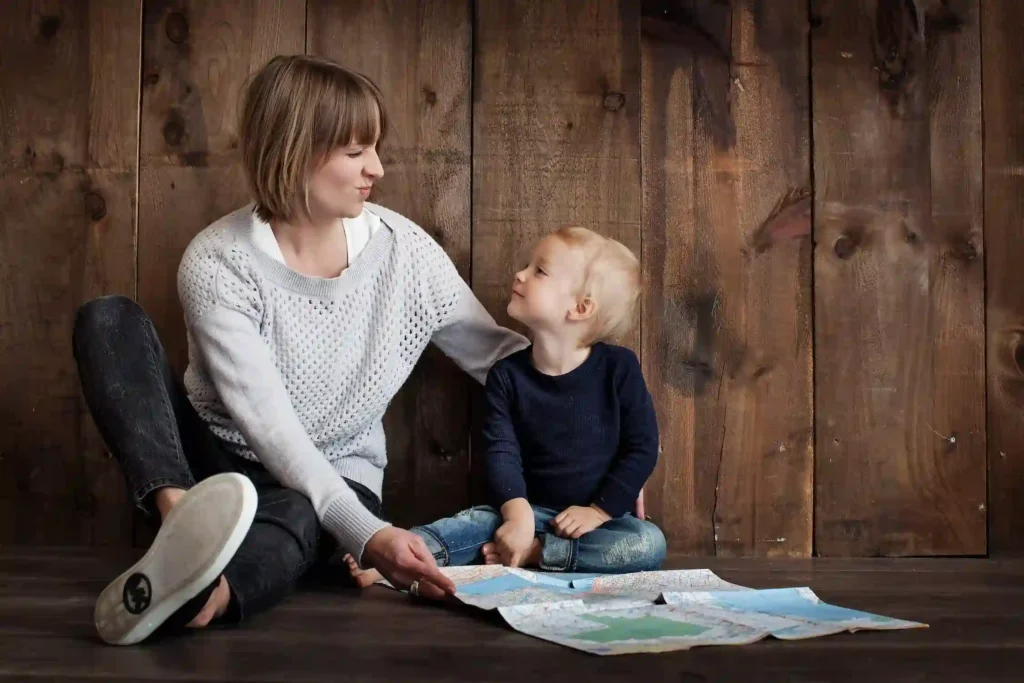As an Amazon Associate I earn from qualifying purchases.
How to Parent a Healthy Family
Being a parent is a complex experience that includes both joys and difficulties.
It’s an artistic function that goes beyond just accountability.
At EatMoveHealthy.com, we are aware of the crucial influence that mindful parenting has on the development of not just children but also entire families.
As a parent, the importance of being attentive, kind, and loving will be emphasized as we discuss the nuances of mindful parenting.
Our mission is to provide you with the information and resources to raise emotionally stable, well-adjusted kids, a critical subject.
How Does Mindful Parenting Work?
Parenting in the Present and with Compassion:
The Essentials
Let’s first develop a clear idea of mindful parenting before moving on to the tactics.
It is the art of interacting with your children while being present, sympathetic, and nonjudgmental. It’s about realizing parenting is a lifelong endeavor, not a checklist.

Mindful parenting encourages being present with your child every moment and accepting their thoughts and feelings without judgment.
It involves establishing a secure and supportive environment where kids feel heard and appreciated.
With the help of this strategy, parents may develop stronger relationships with their kids while encouraging emotional intelligence and resilience.
Encouragement of Emotional Resilience
Educating Kids on Emotional Navigation
Fostering emotional resilience in your children is one of the tenets of mindful parenting.
The development of emotional intelligence, a crucial life skill, can significantly impact a child’s future well-being.
It entails instructing kids in healthy emotion recognition, expression, and regulation.
You can equip your child to effectively handle life’s ups and downs by validating their emotions and educating them about the complexity of feelings.
Open discussions about emotions are encouraged by mindful parenting, which gives kids a secure environment in which to express themselves.
Doing this gives kids the necessary skills to prosper in a society that values emotional complexity.
Communication with Children that Works
Making Open and Encouraging Dialogues
The foundation of healthy parent-child interactions is communication. Practical and compassionate communication is a crucial component of mindful parenting.
With this strategy, parents are encouraged to actively listen to their kids to grasp their issues and points of view.
LEARN HOW TO RAISE GENIUS KIDS!
Trust grows when you foster an atmosphere where kids feel heard and appreciated.
Trust is the foundation of honest and encouraging communication, which enables your child to confide in you, open up about their experiences, and ask for advice when necessary.
Good communication strengthens your relationship with your child and gives them the power to make wise decisions.

Keeping Order and Empathy in Check
Creating Limits with Love
Discipline can be used with kindness and understanding, even though it’s an essential parenting component.
Setting limits with respect and love is encouraged by mindful parenting, which rejects harsh punishment.
Let your child know you’re being strict with them out of love and concern.
This strategy promotes understanding and cooperation rather than fear and hostility.
Additionally, it offers beneficial chances for instruction and learning, changing discipline into a tool for personal development.
Using Mindful Parenting Methods
Simple Techniques for Mindful Parenting
Being a mindful parent entails putting practical strategies into practice every day.
Here, we provide you with a toolkit to help you improve your parenting abilities:
Meditation drills: Use mindfulness techniques to stay present and lower stress levels.
Attempt to actively listen to your child, giving them your whole attention when they most need it.
Resolution of Conflict Techniques: Arm yourself with strategies that put comprehension and resolution ahead of victory.
Empathy Development: Help your child develop empathy by acting empathetically in your interactions with them and other people.
Fostering Family Harmony
Developing a Strong Family Ecosystem
Maintaining a nurturing and loving environment is essential for your family’s health.
The household is included in mindful parenting; it goes beyond one-on-one interactions with your child.
Here are some ideas for building a solid family ecosystem:
In-depth Time: Spend quality time with your family doing things that will deepen ties and produce enduring memories.
Encourage open conversation among family members so everyone feels heard and understood.
Family Conflict Resolution: Teach your kids how to settle disputes amicably and cooperatively to foster harmony within the family.
The Care of Parents' Self
Taking Care of Yourself to Improve Family Care
It’s simple for parents to put their needs last when juggling parental duties. However, attentive parenting understands that caring for oneself is not selfish but necessary. You must look after yourself if you want to be the best parent for your family:
Stress management: Use strategies like meditation, physical activity, or interests that uplift your spirit.
Establishing boundaries: Establish personal boundaries to balance your wants and your family’s desires.
Looking for Support: Feel free to ask friends, family, or professionals for help. It’s a symbol of power, not of fragility.

Conclusion
In conclusion, mindful parenting is more than a method; it is an art and a philosophy that may create strong families and enable kids to develop emotionally.
At eatmovehealthy.com, we are dedicated to giving you the information and resources to adopt mindful parenting.
You may establish a nurturing and supportive atmosphere where your kids can thrive by living the principles of mindful parenting, encouraging emotional resilience, speaking, juggling punishment with empathy, and promoting family well-being.
Remember that the goal is to enable you to build strong families and raise resilient kids, not just to outrank other articles on Google.
May you discover contentment, joy, and deep satisfaction in your mindful parenting journey as you see your kids develop into emotionally intense adults.
FAQ
The whole meaning of family encompasses individuals connected by blood, marriage, adoption, or intense emotional bonds. They provide support, love, and companionship to one another, creating a sense of belonging and unity.
The whole meaning of family encompasses individuals connected by blood, marriage, adoption, or intense emotional bonds. They provide support, love, and companionship to one another, creating a sense of belonging and unity.
The ideal definition of a family is a group of people who care for and support each other unconditionally, sharing common values, traditions, and experiences. They offer emotional, financial, and practical assistance to one another, fostering a sense of security and belonging.
Words that define family include love, support, unity, loyalty, understanding, acceptance, and belonging.
Amazon and the Amazon logo are trademarks of Amazon.com, Inc or it's affiliates.
Related Posts
- The Best 7 Cookware for Healthy Cooking
The Best 7 Cookware for Healthy Cooking Here are the 7 best Non-Toxic Cookware for…
- The Best Plant-Based Proteins
The Best Plant-Based Proteins The Benefits of Incorporating Plant-Based Proteins into Your Diet What are…
- Best Gift Ideas for Every Occasion
Best Gift Ideas for Every Occasion Finding the perfect gift can be challenging, whether for…





